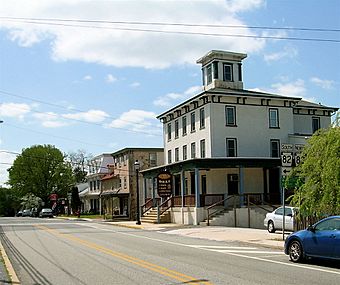Elverson Historic District facts for kids
Quick facts for kids |
|
|
Elverson Historic District
|
|

Elverson Historic District, 2006
|
|
| Location | Main, Chestnut and Hall Sts. and Park Ave., Elverson, Pennsylvania |
|---|---|
| Area | 61 acres (25 ha) |
| Built | 1870 |
| Architectural style | Bungalow/craftsman, Georgian, Gothic Revival |
| NRHP reference No. | 93000354 |
| Added to NRHP | April 29, 1993 |
The Elverson Historic District is a special area in Elverson, Pennsylvania, within Chester County, Pennsylvania. It's like a preserved neighborhood where many old buildings and places tell stories from the past. This district is officially recognized as a national historic district.
It was added to the National Register of Historic Places in 1993. This means it's considered important to American history.
Contents
What is a Historic District?
A historic district is a group of buildings, sites, or objects that are important because of their history or architecture. These areas are protected to keep their unique character. The Elverson Historic District covers about 61 acres.
It includes 133 buildings, 3 sites, and 4 structures that help tell its story. These are called "contributing" elements. They show how the town grew and changed over time.
Exploring Elverson's Architecture
The buildings in the Elverson Historic District show different styles of architecture. You can see examples of:
- Bungalow/Craftsman: These homes are often cozy and built with natural materials. They usually have low-pitched roofs and wide front porches.
- Georgian: This style is known for its balanced and grand look. Buildings often have symmetrical designs and tall windows.
- Gothic Revival: This style often features pointed arches, steep roofs, and decorative details. It can make buildings look like old castles or churches.
These buildings were constructed between about 1750 and 1930. They include homes, shops, and public buildings.
Notable Buildings and Structures
Many buildings in the district are special because of their age or design. Here are a few examples:
- "The Bank House" (around 1750): This is one of the oldest buildings in the district.
- Train Station (1870): This building reminds us of the importance of railroads long ago.
- Springfield M.E. Church (1869): A beautiful church with a long history in the community.
- Blue Rock Hotel (1860): An old hotel that once welcomed travelers.
- Dengler Bro. Store (around 1870): A historic shop that served the town.
- Whoye Horse Tavern (1811): An old tavern where people gathered.
- The Creamery (1906): This building was once used for making dairy products.
- Springfield School (1873): An old school building where many local children learned.
One unique structure is the railroad car named "Baltimore County." It adds to the district's historical feel.
The National Register of Historic Places
The National Register of Historic Places is the official list of the nation's historic places. It is managed by the National Park Service. When a place is added to this list, it means it's important for its history, architecture, or culture. Being on the Register helps protect these special places for future generations.
 | Janet Taylor Pickett |
 | Synthia Saint James |
 | Howardena Pindell |
 | Faith Ringgold |



